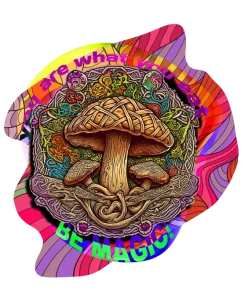Magic mushrooms, or psilocybin mushrooms, have been creating quite a buzz lately in the world of mental health. Beyond their well-known psychedelic effects, these fungi are now being studied for their potential to combat something called pessimism bias. But what exactly is pessimism bias, and how might psilocybin mushrooms help? Let’s dive into the details and explore how these natural wonders and the psychedelic experience could be the key to shifting our outlook on life. Can psilocybin treatment help severe depression? Can it change mental health outcomes and pessimism biases?
What is Pessimism Bias?
Pessimism bias is a cognitive bias that causes individuals to overestimate the likelihood of negative outcomes and underestimate positive ones. This bias can lead to chronic negative thinking, which can affect one’s overall mental health and quality of life. People with a strong pessimism bias are often more likely to experience anxiety and depression because they focus disproportionately on potential threats and negative aspects of their experiences.
This bias is thought to have evolutionary roots. In our ancestral environment, being overly cautious could have been advantageous for survival. However, in the modern world, where most perceived threats are not life-threatening, this bias can be more harmful than helpful. It can limit our ability to take risks, enjoy life, and see opportunities for growth and happiness.
How Do Magic Mushrooms Work?
Magic mushrooms contain the psychoactive compound psilocybin, which, when ingested, is converted into psilocin in the body. Psilocin binds to serotonin receptors in the brain, particularly the 5-HT2A receptors, leading to altered perception, mood, and cognition. This interaction can result in profound changes in how we see the world and ourselves.
Studies have shown that psilocybin can significantly affect the brain’s default mode network (DMN). The DMN is a network of interconnected brain regions that are active when we are at rest and not focused on the outside world, such as during daydreaming, self-reflection, and ruminating on past events. Overactivity in the DMN is associated with various mental health issues, including depression and anxiety.
Psilocybin seems to “reset” the DMN, leading to decreased activity in this network. This reduction in DMN activity can help break the cycle of negative thinking associated with pessimism bias. By disrupting these habitual thought patterns, psilocybin allows for new perspectives and more positive thinking to emerge.
Research on Psilocybin and Pessimism Bias
Several studies have explored the impact of psilocybin on mood and cognitive biases. One notable study conducted by researchers at Johns Hopkins University found that a single high dose of psilocybin resulted in significant and lasting changes in personality traits related to openness and optimism. Participants reported increased feelings of well-being, life satisfaction, and positive changes in attitudes and behaviors. It seems the therapeutic potential is there.
Another study published in the journal “Psychopharmacology” showed that the effects of psilocybin could reduce symptoms of depression and anxiety in patients with treatment-resistant depression. These patients experienced a “reset” in their brain activity, which helped them break free from negative thought patterns and develop a more positive outlook on life.
Research also suggests that psilocybin can promote neuroplasticity, the brain’s ability to form new neural connections. This enhanced plasticity can help individuals rewire their brains away from pessimistic thinking patterns and towards more adaptive and positive ways of processing information.
Personal Accounts and Anecdotal Evidence
In addition to scientific research, there are numerous personal accounts and anecdotal evidence supporting the idea that psilocybin therapy can help with pessimism bias and even major depression and reductions in anxiety. Many people who have taken magic mushrooms report profound shifts in their outlook on life. They describe experiences of deep introspection, where they confront and let go of long-held negative beliefs and fears.
These experiences often include a sense of interconnectedness with others and the world, leading to feelings of compassion and empathy. This sense of unity can help individuals feel more positive and hopeful about their lives and the future. Psychedelic drugs seem to bring about psychological flexibility or cognitive flexibility in people suffering as well as healthy subjects
The Role of Set and Setting
One crucial aspect of using psilocybin to address pessimism bias is the concept of “set and setting.” “Set” refers to the individual’s mindset going into the experience, including their expectations, mood, and mental health. “Setting” refers to the physical and social environment in which the experience takes place.
A positive set and setting can enhance the therapeutic benefits of psilocybin. For example, taking psilocybin in a safe, comfortable environment with supportive individuals can help facilitate a more positive and transformative experience. Conversely, a negative set and setting can lead to challenging experiences that may reinforce negative thinking.
Potential Therapeutic Applications
Given its potential to reduce pessimism bias, psilocybin could have a wide range of therapeutic applications. Here are some areas where it might be particularly beneficial:
- Depression and Anxiety: By disrupting negative thought patterns and promoting new ways of thinking, psilocybin could provide relief for individuals suffering from depression and anxiety. This is especially relevant for those with treatment-resistant conditions.
- PTSD: Psilocybin’s ability to promote emotional processing and reduce fear responses could make it a valuable tool for individuals with PTSD. It can help them confront and integrate traumatic memories in a supportive setting.
- Addiction: Negative thinking patterns often underlie addictive behaviors. Psilocybin can help individuals break free from these patterns and develop healthier coping mechanisms.
- End-of-Life Anxiety: For individuals facing terminal illnesses, psilocybin can alleviate existential distress and foster a sense of peace and acceptance. This can be particularly helpful in palliative care settings.
Practical Tips for Using Psilocybin to Combat Pessimism Bias
If you’re considering using psilocybin to address pessimism bias, here are some practical tips to ensure a safe and positive experience:
- Start with a Low Dose: If you’re new to psilocybin, start with a low dose to gauge your sensitivity and response. You can gradually increase the dose in subsequent sessions.
- Choose the Right Setting: Select a comfortable and safe environment where you feel relaxed and at ease. A familiar setting with trusted friends or a guide can enhance the experience.
- Set Clear Intentions: Reflect on what you hope to achieve from the experience. Setting clear intentions can help guide the experience and create a more meaningful outcome.
- Have a Trip Sitter: If you’re new to psilocybin or feel uncertain, consider having a sober trip sitter. A trip sitter can provide support and reassurance, ensuring a safe and positive experience.
- Embrace the Moment: Allow yourself to be present and fully engaged in the experience. Let go of expectations and enjoy the enhanced perceptions and insights.
- Integrate the Experience: After the experience, take time to reflect on the insights gained. Journaling, meditation, and discussions with friends or a therapist can help integrate the experience into your daily life.
The Future of Psilocybin Research
As research on psilocybin continues to grow, its potential to address pessimism bias and other mental health issues becomes increasingly evident. Institutions like Johns Hopkins University and Imperial College London are at the forefront of this research, conducting rigorous studies to explore the therapeutic benefits of psilocybin.
The Multidisciplinary Association for Psychedelic Studies (MAPS) and other organizations are also leading efforts to destigmatize psychedelics and promote their therapeutic use. As the evidence base grows, we can expect to see changes in public perception and policy, potentially leading to broader acceptance and availability of psilocybin-based therapies.
Conclusion
Magic mushrooms, with their active compound psilocybin, hold significant promise as a potential cure for pessimism bias. By disrupting negative thought patterns and promoting new ways of thinking, psilocybin can help individuals develop a more positive and adaptive outlook on life. As research continues to uncover the therapeutic benefits of psilocybin, it could become a valuable tool in mental health treatment, offering hope and healing to many.
For those interested in exploring the benefits of psilocybin, it’s important to approach the experience with caution, respect, and clear intentions. By doing so, you can unlock the magic of psilocybin and create enriching and transformative experiences.
In the ever-evolving world of psychedelics, the potential of psilocybin to combat pessimism bias is a reminder of the profound ways in which these substances can enhance our lives. Whether through scientific research or personal exploration, psilocybin continues to reveal its transformative potential, offering a path to greater well-being and positivity.
Short Description:
Explore how magic mushrooms, with their active compound psilocybin, can help combat pessimism bias and foster a more positive outlook on life. Discover practical tips for a safe and transformative experience and learn about the ongoing research into the therapeutic benefits of psilocybin.



